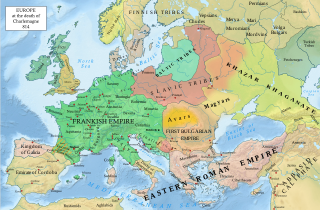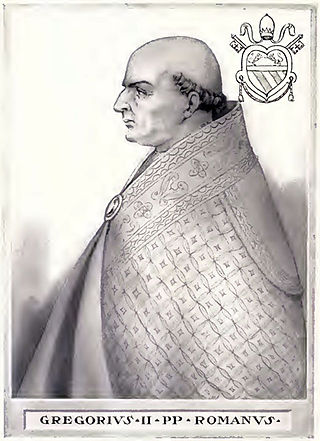Related Research Articles
The 810s decade ran from January 1, 810, to December 31, 819.
The 760s decade ran from January 1, 760, to December 31, 769.
The 750s decade ran from January 1, 750, to December 31, 759.
The 710s decade ran from January 1, 710, to December 31, 719.
The 700s decade ran from January 1, 700, to December 31, 709.

Year 814 (DCCCXIV) was a common year starting on Sunday of the Julian calendar, the 814th year of the Common Era (CE) and Anno Domini (AD) designations, the 814th year of the 1st millennium, the 14th year of the 9th century, and the 5th year of the 810s decade.

Year 754 (DCCLIV) was a common year starting on Tuesday of the Julian calendar, the 754th year of the Common Era (CE) and Anno Domini (AD) designations, the 754th year of the 1st millennium, the 54th year of the 8th century, and the 5th year of the 750s decade. The denomination 754 for this year has been used since the early medieval period, when the Anno Domini calendar era became the prevalent method in Europe for naming years.
The 680s decade ran from January 1, 680, to December 31, 689.

Year 774 (DCCLXXIV) was a common year starting on Saturday of the Julian calendar. The denomination 774 for this year has been used since the early medieval period, when the Anno Domini calendar era became the prevalent method in Europe for naming years.

Year 635 (DCXXXV) was a common year starting on Sunday of the Julian calendar. The denomination 635 for this year has been used since the early medieval period, when the Anno Domini calendar era became the prevalent method in Europe for naming years.

Year 756 (DCCLVI) was a leap year starting on Thursday of the Julian calendar, the 756th year of the Common Era (CE) and Anno Domini (AD) designations, the 756th year of the 1st millennium, the 56th year of the 8th century, and the 7th year of the 750s decade. The denomination 756 for this year has been used since the early medieval period, when the Anno Domini calendar era became the prevalent method in Europe for naming years.

Year 759 (DCCLIX) was a common year starting on Monday of the Julian calendar. The denomination 759 for this year has been used since the early medieval period, when the Anno Domini calendar era became the prevalent method in Europe for naming years.
Year 763 (DCCLXIII) was a common year starting on Saturday of the Julian calendar. The denomination 763 for this year has been used since the early medieval period, when the Anno Domini calendar era became the prevalent method in Europe for naming years.

Year 766 (DCCLXVI) was a common year starting on Wednesday of the Julian calendar, the 766th year of the Common Era (CE) and Anno Domini (AD) designations, the 766th year of the 1st millennium, the 66th year of the 8th century, and the 7th year of the 760s decade. The denomination 766 for this year has been used since the early medieval period, when the Anno Domini calendar era became the prevalent method in Europe for naming years.

Year 815 (DCCCXV) was a common year starting on Monday of the Julian calendar, the 815th year of the Common Era (CE) and Anno Domini (AD) designations, the 815th year of the 1st millennium, the 15th year of the 9th century, and the 6th year of the 810s decade.

Year 715 (DCCXV) was a common year starting on Tuesday of the Julian calendar. The denomination 715 for this year has been used since the early medieval period, when the Anno Domini calendar era became the prevalent method in Europe for naming years.

Year 712 (DCCXII) was a leap year starting on Friday of the Julian calendar, the 712th year of the Common Era (CE) and Anno Domini (AD) designations, the 712th year of the 1st millennium, the 12th year of the 8th century, and the 3rd year of the 710s decade. The denomination 712 for this year has been used since the early medieval period, when the Anno Domini calendar era became the prevalent method in Europe for naming years.

700 (DCC) was a leap year starting on Thursday of the Julian calendar, the 700th year of the Common Era (CE) and Anno Domini (AD) designations, the 700th year of the 1st millennium, the 100th and last year of the 7th century, and the 1st year of the 700s decade. As of the start of 700, the Gregorian calendar was 3 days ahead of the Julian calendar, which was the dominant calendar of the time.

Year 668 (DCLXVIII) was a leap year starting on Saturday of the Julian calendar. The denomination 668 for this year has been used since the early medieval period, when the Anno Domini calendar era became the prevalent method in Europe for naming years.
Year 580 (DLXXX) was a leap year starting on Monday of the Julian calendar. The denomination 580 for this year has been used since the early medieval period, when the Anno Domini calendar era became the prevalent method in Europe for naming years.
References
- ↑ John V.A. Fine, Jr (1991). The Early Medieval Balkans: A Critical Survey from the Sixth to the Late Twelfth Century, p. 77. ISBN 978-0-472-08149-3